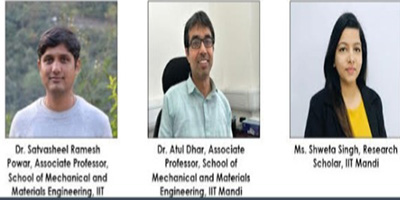MANDI: In a breakthrough study, researchers at the Indian Institute of Technology (IIT) Mandi have shed light on the significant benefits of recycling end-of-life solar cells. These findings have the potential to transform the solar industry and contribute to a more sustainable future.
According to IIT Mandi's spokesperson, this discovery by the IIT Mandi researchers opens up new possibilities for a greener and more environmentally friendly solar industry.
In addition to policy changes, the research team has developed a comprehensive recycling methodology that encompasses a range of approaches, such as Reduce, Reuse, Repurpose, Repair, Refurbish, Redesign, Remanufacture, and Recycle.
This holistic approach aims to minimize waste generation and energy consumption during the end-of-life processing of solar PV modules.
The researchers focused on comparing the environmental impact of recycling solar cell components and materials with conventional mining and production practices.
They found that recycling old solar cells can significantly reduce environmental harm, making it a much more eco-friendly alternative.
India's solar energy infrastructure has been rapidly expanding, reaching an impressive capacity of around 62 GW by November 2022.
However, with solar cell modules having an average lifespan of about 30 years, a massive amount of solar cell waste is projected to be generated by 2050, ranging from 4.4 to 7.5 million tonnes. Alarmingly, this could lead to solar panel waste becoming the most predominant type of refuse in landfills as early as 2030.
Understanding the urgency of this environmental challenge, Dr. Satvasheel Ramesh Powar, the lead researcher, emphasized the need to explore solutions that involve reuse, repurposing, recycling, and recovering valuable resources from solar cell waste.
One of the significant advantages of recycling solar cell modules is the recovery of valuable resources such as cadmium, tellurium, indium, gallium, and germanium.
These materials are in high demand within the industry and have limited reserves.
By recycling and reusing these resources, we can reduce the strain on natural reserves and minimize the environmental impact of traditional mining and production methods, they said.
To address this pressing issue, the IIT Mandi researchers recommend proactive measures by governments and industry stakeholders.
They advocate for the implementation of green certifications and incentives to encourage recycling and mineral recovery in the photovoltaic industry.
Moreover, the researchers propose optimizing the design of PV modules to reduce waste during disposal by incorporating sustainable materials and adhering to the "design to dismantle" principle.





